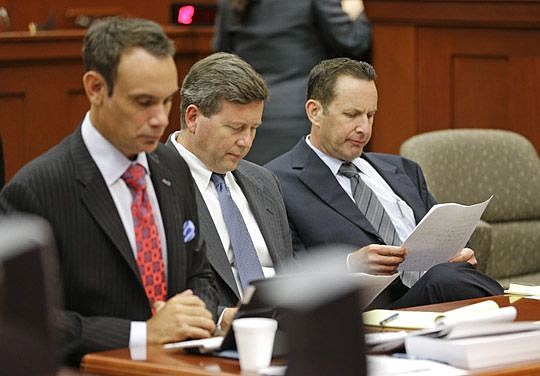
Should a lawyer fear prosecution for legal advice given to a client?
In the case of State v. Kelly Mathis, the answer to that question is yes.
On Nov. 18, attorney Mitch Stone will be speaking to The Jacksonville Bar Association at the membership luncheon about the trial and appeal of his client, Mathis. This case is significant because it demonstrates that lawyers may be exposed to criminal liability for giving legal advice to a client.
The 5th District Court of Appeal recently reversed multiple convictions against Mathis and prison sentences for alleged crimes arising from legal advice he gave to his client concerning whether internet cafes could be operated lawfully in Florida.
The unanimous opinion filed by the DCA on Oct. 14 was an overwhelming victory for Mathis.
In essence, the opinion explained the jury trial was unfair to Mathis because the trial court denied Mathis the opportunity to present his side of the case — that internet cafes were not prohibited by Florida and were, therefore, not criminal.
By way of background, a Sanford County jury found Mathis guilty for alleged crimes arising from legal advice he provided to his client concerning whether the client could legally operate internet cafes in Florida.
Relying on the advice, Mathis’s client opened its first internet cafe in Jacksonville in 2007. Over the next four years, Mathis continued to provide legal advice related to zoning issues in proposed locations as his client’s operation expanded to 50 locations.
In 2011, longtime Seminole County Sheriff Don Eslinger began investigating Mathis and his client.
At the end of the investigation, 57 people, including Mathis, were arrested and charged with numerous counts of racketeering for conduct related to the internet cafes.
Mathis pled not guilty, maintained his innocence and proceeded to trial.
Before the trial began, Mathis and Stone sought to justify the legal advice by introducing the following evidence:
• Ordinances regulating internet cafes in Jacksonville and Clay, Leon, Seminole, St. Johns, Volusia and Wakulla counties
• A circuit court order upholding the Jacksonville ordinance
• Various Florida House of Representatives staff analyses and proposed bills regulating internet cafes
The state sought to prevent Mathis from allowing the jury to hear the exculpatory evidence by convincing the trial court Mathis’s status as an attorney was immaterial.
Because of this representation, the trial court precluded the exculpatory evidence, reasoning “if the State decides that they are going to single him out as the attorney, which necessitates you having to bring in these other attorneys for some reason, I’ll be very careful to hear what they have to say as far as that’s concerned, but otherwise to me … it’s a simple trial with a bunch of defendants here going on.
“And the fact that you are concerned or for some reason you think they’re focusing on him as the attorney to where you need to bring other attorneys to give their interpretation of the law, I just don’t see that, really,” the trial court said.
After achieving the favorable ruling, the state contradicted its pretrial assertion that it would not focus on Mathis’s status as an attorney.
Throughout the monthlong trial, the state repeatedly focused on Mathis’s status as an attorney.
During jury selection, one of the prosecutors told the jury, “Our charges relate to his practice of law.”
During the opening statement, the state informed the jury, “He’s a lawyer and he gamed the legal system.”
Even in its closing arguments, the state continued to single out Mathis as an attorney and argued, “But why are we here on Mathis? Because of the way he gamed the law, the way he chose to practice law, to mislead, to deceive. … You know, the defense kept on talking to you about — about he’s only an attorney, he was just an attorney and how he acted like an attorney.
“The problem is in this case, you can’t hide behind The Florida Bar. You can’t hide behind your Bar card. … You know, it’s not only — it’s aggravated because he was a lawyer and he knew better,” the state continued.
After being presented with only one side of the evidence, the jury had little choice but to conclude that Mathis was guilty.
After the verdict, he was sentenced to six years in prison.
Meanwhile, the trial court did not send any of the other 56 defendants to prison.
On appeal, and despite its arguments at trial, the state claimed Mathis “was not prosecuted for his legal opinions or legal counseling; rather, he was prosecuted for his illegal actions.”
In a unanimous decision reversing the convictions, the appellate court found the trial court should have permitted Mathis to introduce exculpatory evidence relating to ordinances regulating internet; a circuit court order upholding the Jacksonville ordinance; and various House of Representatives staff analyses and proposed bills regulating internet cafes.
The appellate court noted the state repeatedly focused on Mathis’s status as an attorney throughout the trial even though this theme was contrary to the state’s pretrial assertion.
The DCA ordered a new trial and said that Mathis should be allowed to present evidence providing the full context for his legal representation.
It seems clear from the opinion Mathis was subject to an unfair trial.
With this backdrop, there are a number of questions that come to mind.
• Why didn’t the court grant a mistrial when the state contradicted its pretrial assertion that it would not focus on Mathis’s capacity as an attorney?
• Did it matter whether the advice Mathis provided was right or wrong?
• What about the mistake of law defense? Should the prosecution drop the case against Mathis? If not, should Mathis move to recuse the trial judge?
We look forward to hearing Mitch Stone speak to The Jacksonville Bar Association about this case.